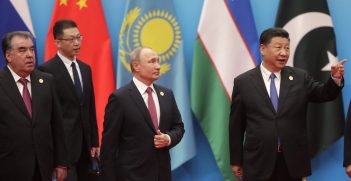An Ideal Gone Wrong? Interpreting the October Revolution in Modern Russia

This week marks the centenary of the October Revolution and is a time well-suited for reflection on the consequences of the world-changing events of 1917. How has Russia changed and have the ideals of revolution been forgotten?
There is a distinct phenomenon at play as the 100th anniversary of the Russian revolution approaches. In the flurry of commentary in the Western world, a cluster of myopic questions is being asked with one idea at the core of them all: Was the 1917 revolution an experiment gone wrong that did little more than show up the superiority of what it was opposed to? The answer is invariably ‘yes’, evidenced by the capitalism of today’s Russia.
The question, however, misses the point of the 1917 revolution. It was an ideal attempting to take root in an idealistic state born of the ashes of an empire that destroyed itself. It was an ideal that thought a genuinely new society could be built by the oppressed and the exploited masses, terms which sound flippant and ideological but were in the historical context of the times, meaningful and full of hope. It was an ideal that spirited Russia into the modern era faster and for a time more successfully than anywhere else in the world, creating an educated populace in the process. That it failed as an experiment had nothing to do with the ideals of the revolution’s protagonists and a lot to do with the authoritarianism, the cruelty, the executions and the famines they resorted to in order to achieve it and of course the corruption the system spawned. Nor did its failure have much to do with the superiority of what replaced it, for capitalism, in both the West and now in Russia, is proving to be less than exemplary.
Russia understands this. There are more views on what the revolution means in the great expanse of Russian history and how it should be marked than the number of days in the seven decades of communist rule. If there is a strand of thought they share, it is that the revolution should be viewed as a more nuanced event than one which allowed the West to triumph over Russia. The new Russia, wildly capitalist, hell-bent on consumerism and individualism, can and does still mourn the loss of an ideal whilst it bemoans the hideous inequality, corruption and cruelty it produced. Not even the elderly think of Lenin as a giant. But they do, across those age demographics that remember the USSR, wonder what might have been if not for the greed and corruption that killed the ideal and which is now part of their daily life. For the those with no memory of the USSR—a growing and more vocal number—the revolution is a lesson in how not to rule.
This is reflected in any number of Levada polls which show 56 per cent believe Lenin played a positive role in Russian history (22 per cent believe he didn’t), though a mere 6 per cent are proud of the October Revolution. A 2016 poll showed more than 50 per cent of Russians believed the collapse of the Soviet Union in 1991 was bad, though a majority think its restoration is impossible with roughly the same number saying they’d be unhappy if that came to pass.
The critics will say the polls conducted by Levada are inconsequential because President Vladimir Putin’s authoritarian ways have shut down the capacity of Russians to think independently (read: according-to-Western-views), outside the Kremlin box. I have always found this latter argument difficult to accept. Whilst challenging, independent media has been severely diminished, it hasn’t been wiped out completely even if it is harder to access. Russians still travel and at home they freely access the internet. It is easy sitting in the West to think of Russia as a nation of sheep gripped by fear, unwilling to risk life by bucking the Kremlin orthodoxy. The reality on the ground feels vastly different.
President Putin is clearly not keen on any big-show celebrations of the revolution. He is fixated on what he sees as more important to Russia—next year’s presidential election and a future with him still at the helm. Putin finds himself navigating this tricky anniversary by quietly avoiding the competing sensitivities: between those who see Lenin and his comrades as evil for having murderously eliminated the Czar and his family, and those who quite admire Lenin for his ‘ideals’; between those who enjoy the fruits of Russian capitalism and those (the majority) who continue to flail and suffer beneath its weight; and between those who see Putin himself as a reincarnation of an ideologically driven despot and those who see no harm in trusting him with the Kremlin for another four years, if for no other reason than to keep the peace.
Putin is playing Switzerland.
In the meantime, as usual, on the streets in cities, towns and villages and in museums across the country, Russians are doing their own thing.
Local museums are mounting projects, not steeped in ideological argument but in the cultural and artistic achievements of the ‘ideal’. Few are sponsored by the Kremlin or even sanctioned by it. In Moscow, there was the recent retrospective of Aristarkh Lentulov who painted the new revolutionary Russia as his friend Vladimir Mayakovsky wrote it. There were exhibitions of archival material in the Lenin Library and the State Tretyakov Gallery, as well as at the State Museum of Political History that mounted ‘Women and Revolution’, an almost tongue-in-cheek celebration of what the revolution achieved for women (nothing). In St Petersburg, Rasputin seems to have cornered the anniversary imagination, despite the fact his death had nothing to do with the Bolsheviks. The Hermitage treated the anniversary more earnestly than most. Theatres, mostly small but some big, have staged performances about the Red Terror, the Ukrainian famine and, of course, the failed ideal.
The common thread throughout the country’s anniversary acknowledgment, quiet though it is, is that it was an ideal gone wrong. For the young, the meaning perhaps is that Lenin and his cadres are a warning to Vladimir Putin and his group that Russians can be abused by their leaders for decades, but eventually they rise to be counted.
For the West, so determined to continue its dance on the USSR’s grave, the revolution should stand as a lesson in what happens when plurality of thought is absent. Capitalism has given rise to generations of disenfranchised people: think Brexit, Trump and the alt-Right. There may be differences between the disenfranchised in Russia circa 1917 and the disenfranchised in the West now, but the catalyst for the changes each group inspired is the same—single voices loudly proclaiming the imminent arrival of nirvana.
Monica Attard OAM is an Australian journalist and the winner of five Walkley Awards including the 1991 Gold Walkley Award. She was honoured with the Medal of the Order of Australia in 1992 for her work as a Russian correspondent during the fall of the USSR. She is also the author of ‘Russia: Which way Paradise?’ Published in 1997.
This article is published under a Creative Commons Licence and may be republished with attribution.





